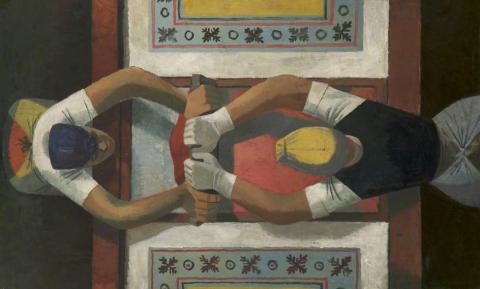
Third Conference of the European Labour History Network (ELHN)
Amsterdam, 19-21 September 2019
Written and Visual Representations of the World of Work "in and by the Working Class"
Call for Papers for a Session
Coordinators:
- Timothy Ashplant, t.g.ashplant@kcl.ac.uk
- Nathalie Ponsard, nat.ponsard@wanadoo.fr
- Mike Sanders, Michael.Sanders@manchester.ac.uk
- Luisa Veloso, luisa.Veloso@iscte.pt
The workshop intends to continue its reflection on the representations of the world of work "in and by the working class", begun at the first two ELHN conferences (Torino, 2015; Paris, 2017). For the forthcoming third conference (Amsterdam, 2019) its focus will be on both written and visual representations, which constitutes an original approach insofar as these two fields of research are often separated. More particularly, this third phase of reflection will focus on the process of creation, or in other words the creative capacity of the workers: the capacity to write as much as the capacity to make workers' language visible through film, or to capture moments of work and/or life through photography or pictorial work - in the context of a transnational European history.
On the one hand, the workshop aims to deepen understanding of the conditions and spaces of individual and collective creative works, to decipher the modalities of co-construction at work with activists from other social milieux and with other models of writing, photography, film.
On the other hand, it aims to explore the reception of these creative works in the workers' world and in the dominant and "legitimate" cultural fields.
Finally, through the analysis of the representations carried by these creative works, we will pose questions about their uses and their meanings. We will study their role in the memorial construction of this or that working-class community, as well as the representations and reinterpretations of social events. We will raise the question of their possible critical significance.
Beyond these three axes, the workshop also aims to conduct a methodological reflection on the most appropriate tools to interpret these creative works, and to study the ways in which they are collected and preserved.
The aim is therefore to continue the reflection based on a range of case studies from different cultural forms and European countries.
---------------------------------------
Représentations écrites et visuelles du monde du travail « dans et par le monde ouvrier »
A la suite des deux dernières journées d’études , l’atelier souhaite poursuivre sa réflexion sur les représentations – écrites et visuelles – du monde du travail « dans et par le monde ouvrier », ce qui constitue une originalité dans la mesure où ces deux champs de recherche sont souvent disjoints. Plus particulièrement, ce troisième temps de réflexion entend se focaliser sur le processus de création ou autrement dit la capacité créatrice des ouvriers : autant la capacité d’écrire que la capacité de rendre visible la parole ouvrière à travers les films, ou de capter des moments de travail et/ou de vie par la photographie ou l’œuvre picturale dans le cadre d’une histoire transnationale européenne.
D’une part, l’atelier vise à mieux comprendre les conditions et les espaces des créations individuelles et collectives, à décrypter les modalités de co-construction à l’œuvre avec d’autres acteurs sociaux et avec d’autres modèles d’écritures, de photographie, de films.
D’autre part, il entend explorer la réception de ces créations dans le monde ouvrier et dans les champs culturels dominants et « légitimes ».
Enfin, à travers l’analyse des représentations, portées par ces créations, on s’interrogera sur leurs usages et leurs significations. On étudiera leur rôle sur la construction mémorielle de telle ou telle communauté ouvrière, ainsi que sur les représentations et les réinterprétations des événements sociaux. On posera la question de leur éventuelle portée critique.
Au-delà de ces trois axes, l’atelier vise aussi à mener une réflexion méthodologique sur les outils les plus adéquats pour interpréter ces créations et envisage d’étudier les manières dont elles sont collectées et conservées.
L’objectif est de donc poursuivre la réflexion en nous fondant sur une diversité d’études de cas, relevant de formes culturelles variées et de divers pays européens.
---------------------------------------
How to apply
Please send an abstract (max. 400 words) and a short academic CV (max. 400 words) to the coordinators. The proposal should include name, surname, current affiliation (if any) and contact details of the proponent. Papers may be presented in either English or French.
Deadline for abstracts submissions
Please send an abstract (max. 400 words) by September 5th, 2018. The outcome of the selection will be communicated in October 2018.
Location
The Third Conference of the European Labour History Network (ELHN) will take place on 19-21 September 2019 in Amsterdam, at the International Institute of Social History.
